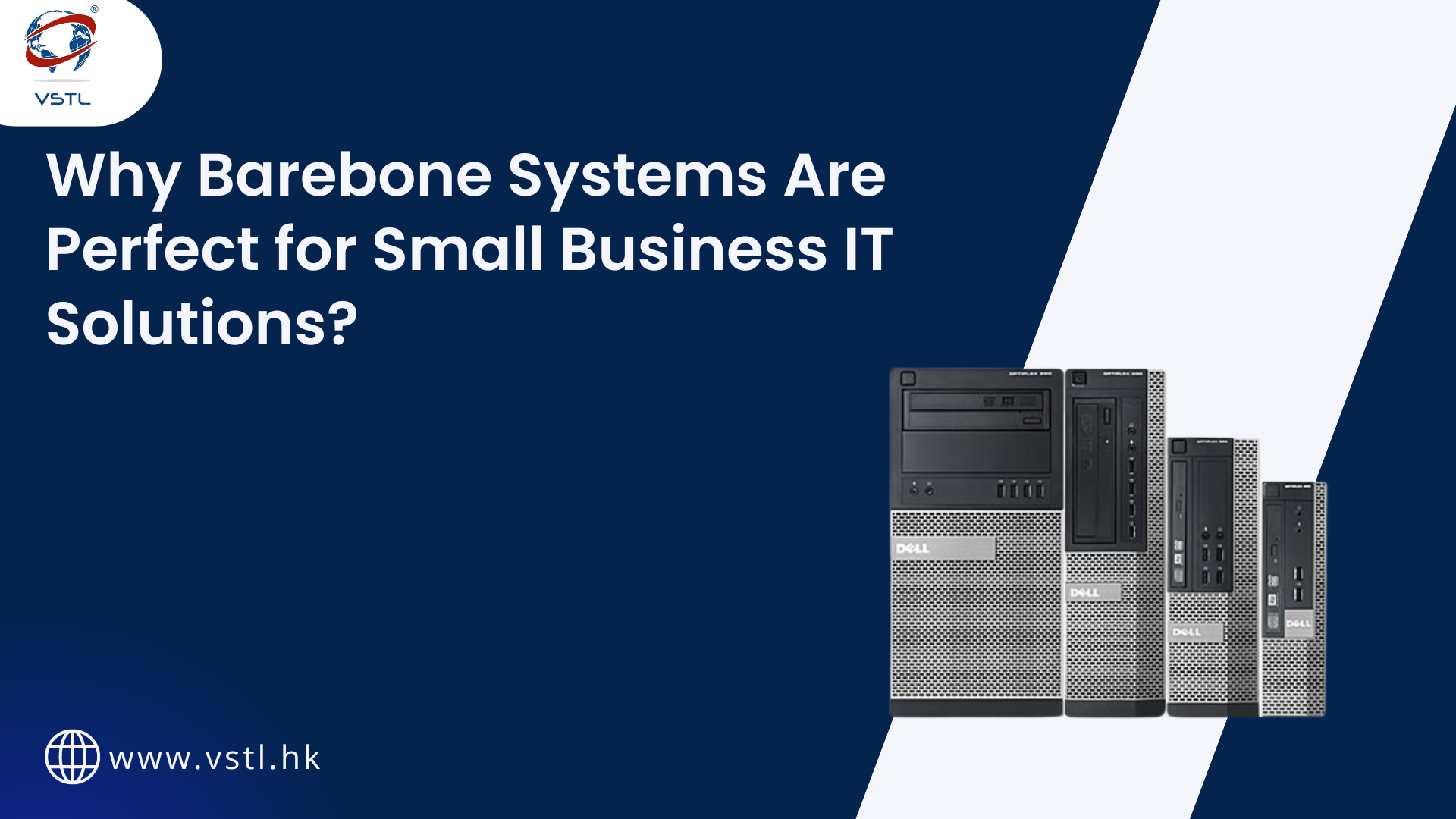
In today’s fast-paced business environment, small businesses face unique challenges in staying competitive. One of the most significant hurdles is managing IT infrastructure that is both efficient and cost-effective. Barebone systems have emerged as an ideal solution for small businesses seeking to maximize their IT investments without compromising on performance or scalability.
This blog will explore why barebone systems are perfect for small business IT solutions. We’ll discuss what barebone systems are, their benefits, and how they can be tailored to meet the specific needs of small businesses.
Understanding Barebone Systems
Before diving into the benefits, it’s important to understand what a barebone system is. A barebone system is a partially assembled computer kit. It typically includes essential components like the case, power supply, motherboard, and sometimes the processor and cooling system. The buyer must add additional components such as RAM, storage, and an operating system to complete the build.
Barebone systems offer a middle ground between purchasing a fully assembled computer and building one from scratch. This flexibility allows small businesses to customize their IT infrastructure to meet specific needs while maintaining control over costs.
Key Benefits of Barebone Systems for Small Businesses
- Cost-Effective Solutions
One of the most compelling reasons small businesses should consider barebone systems is their cost-effectiveness. Traditional pre-built computers often come with features and components that may not be necessary for all businesses. With barebone systems, small businesses only pay for the components they need, avoiding unnecessary expenses.
Additionally, barebone systems allow businesses to start small and scale up as needed. If a company needs more storage or memory in the future, these components can be added without the need for a completely new system. This modularity makes barebone systems an excellent investment for growing businesses.
- Customization and Flexibility
Every small business has unique IT requirements, and one-size-fits-all solutions rarely work. Barebone systems offer a high level of customization, allowing businesses to tailor their computers to specific tasks.
For example, a graphic design firm may require high-end GPUs and large amounts of RAM, while an accounting firm might prioritize storage and processing power. With barebone systems, businesses can select components that best suit their needs, ensuring optimal performance without paying for unnecessary features.
Furthermore, barebone systems can be customized to fit specific software requirements. Whether a business relies on Windows, Linux, or specialized software, barebone systems can be configured to run the necessary programs efficiently.
- Scalability
As businesses grow, their IT needs evolve. One of the significant advantages of barebone systems is their scalability. Businesses can start with a basic configuration and gradually upgrade as their needs expand.
For instance, a startup might begin with a modest setup and add more powerful components as the business grows. This approach ensures that IT infrastructure keeps pace with the company’s development without requiring significant upfront investments.
Additionally, barebone systems are often compatible with a wide range of components, making it easier to find upgrades that fit the existing setup. This adaptability is particularly valuable for small businesses that need to remain agile and responsive to changing market conditions.
- Reduced Maintenance Costs
Maintaining IT infrastructure can be a significant expense for small businesses. Barebone systems help reduce these costs by allowing businesses to select high-quality, reliable components that require less frequent maintenance.
Moreover, because barebone systems are modular, if a component fails, it can be replaced without affecting the entire system. This reduces downtime and repair costs, ensuring that the business can continue operating smoothly.
Additionally, many barebone systems come with warranties on individual components, providing further peace of mind. This approach to maintenance is both cost-effective and efficient, making it an attractive option for small businesses.
- Energy Efficiency
In today’s environmentally conscious world, energy efficiency is a priority for many businesses. Barebone systems often use less power than traditional desktop computers, especially when configured with energy-efficient components.
Small businesses can save on energy costs by selecting components that consume less power and generate less heat. This is particularly important for businesses operating in areas with high electricity costs or those looking to reduce their environmental impact.
Moreover, energy-efficient barebone systems can contribute to a company’s sustainability goals, enhancing its reputation with eco-conscious customers and partners.
- Space-Saving Design
Office space is often at a premium for small businesses, and large, bulky computers can take up valuable real estate. Barebone systems are typically more compact and can be designed to fit in tight spaces.
Miniature barebone systems, such as Intel NUCs (Next Unit of Computing), offer powerful computing in a small form factor. These systems can be mounted behind monitors or tucked away in small cabinets, freeing up desk space and creating a more organized work environment.
For businesses with limited office space, the space-saving design of barebone systems is a significant advantage, allowing them to maximize their workspace without compromising on performance.
- Improved Security
Security is a top concern for small businesses, and barebone systems can play a role in enhancing IT security. By customizing their systems, businesses can select components and software that meet their specific security requirements.
For example, businesses handling sensitive data can choose motherboards with advanced encryption capabilities or install specialized security software directly on the system. Additionally, because barebone systems are often built in-house, businesses have greater control over the hardware and software installed, reducing the risk of vulnerabilities associated with pre-built systems.
The ability to tailor security features to the unique needs of the business is a crucial advantage of barebone systems, providing peace of mind and protecting valuable data.
- Enhanced Performance
Barebone systems allow small businesses to optimize performance for specific tasks. By carefully selecting the right components, businesses can ensure that their systems run efficiently and handle the demands of their day-to-day operations.
For instance, a business that relies heavily on data processing can prioritize high-speed processors and SSDs (Solid State Drives) to minimize latency and improve processing times. Similarly, a company focused on multimedia production can opt for high-performance GPUs and RAM to handle complex rendering tasks.
This focus on performance ensures that the business’s IT infrastructure is not only capable but also optimized for its specific needs, leading to improved productivity and better overall results.
- Future-Proofing Your Business
Technology evolves rapidly, and staying ahead of the curve is essential for small businesses. Barebone systems offer a degree of future-proofing by allowing businesses to upgrade components as new technologies become available.
For example, a business might start with a basic processor and upgrade to a more powerful one as new models are released. Similarly, as storage technology advances, businesses can easily add larger or faster drives to their existing barebone systems.
This ability to adapt and upgrade ensures that a business’s IT infrastructure remains relevant and capable of handling future demands without the need for complete system overhauls. Future-proofing with barebone systems is not only cost-effective but also a strategic approach to long-term business growth.
- Simplified IT Management
Managing IT infrastructure can be daunting for small businesses, especially those without dedicated IT staff. Barebone systems simplify IT management by providing a streamlined, customizable platform that is easier to maintain and upgrade.
Because businesses can choose components that are familiar and compatible with their existing systems, there is less complexity involved in managing and troubleshooting issues. This simplicity extends to software management as well, as businesses can install only the necessary programs and avoid the bloatware often found on pre-built systems.
For small businesses, the ease of managing barebone systems translates to less time spent on IT issues and more time focused on core business activities.
- Supporting Remote Work
The rise of remote work has created new challenges for small businesses in managing their IT infrastructure. Barebone systems offer a flexible solution for remote workers, allowing businesses to provide customized systems that meet the specific needs of their remote teams.
For instance, businesses can configure barebone systems to support remote desktop applications, VPNs (Virtual Private Networks), and secure cloud storage. These tailored setups ensure that remote employees have the tools and resources they need to work efficiently and securely from any location.
Moreover, the compact design of many barebone systems makes them ideal for home offices, where space may be limited. This adaptability ensures that businesses can support remote work effectively while maintaining control over their IT infrastructure.
- Compliance and Regulatory Considerations
Small businesses often need to comply with industry-specific regulations and standards, particularly in sectors like finance, healthcare, and legal services. Barebone systems can be customized to meet these regulatory requirements, ensuring compliance and avoiding potential legal issues.
For example, businesses can select motherboards and processors that support encryption standards required by regulations like GDPR (General Data Protection Regulation) or HIPAA (Health Insurance Portability and Accountability Act). Additionally, businesses can install compliance-focused software to monitor and manage data security and access controls.
This ability to tailor systems to meet regulatory requirements is a significant advantage for small businesses operating in highly regulated industries.
- Collaboration and Networking Capabilities
Collaboration is key to the success of any small business, and barebone systems can be configured to enhance collaboration and networking capabilities. Whether it’s setting up a local network for file sharing or configuring systems for video conferencing, barebone systems offer the flexibility to support a wide range of collaboration tools.
Businesses can select network adapters, storage solutions, and collaboration software that integrate seamlessly with their existing infrastructure. This customization ensures that employees can work together efficiently, whether they are in the office or working remotely.
Furthermore, barebone systems can be configured to support cloud-based collaboration tools, enabling real-time communication and file sharing across teams and locations. This adaptability is crucial for small businesses looking to foster a collaborative work environment.
- Reliable Support and Warranties
When investing in IT infrastructure, support and warranties are critical considerations. Many barebone systems come with manufacturer warranties on individual components, providing assurance in case of hardware failure.
Additionally, because barebone systems are often built using widely available components, finding replacement parts or support is generally straightforward. This availability reduces downtime and ensures that businesses can quickly resolve any issues that arise.
For small businesses, the reliability of support and warranties associated with barebone systems is an important factor in minimizing risks and ensuring smooth operation.
- Conclusion: The Perfect IT Solution for Small Businesses
Barebone systems offer a unique combination of cost-effectiveness, customization, scalability, and performance that makes them an ideal IT solution for small businesses. Whether you’re a startup looking to minimize upfront costs, a growing company in need of scalable IT infrastructure, or an established business seeking to optimize performance, barebone systems provide the flexibility and adaptability required to meet your specific needs.
By investing in barebone systems, small businesses can create a tailored IT environment that supports their operations, enhances productivity, and positions them for future growth. With the ability to customize, upgrade, and manage IT infrastructure efficiently, barebone systems are not just a cost-effective option—they are the perfect solution for small business IT needs.
